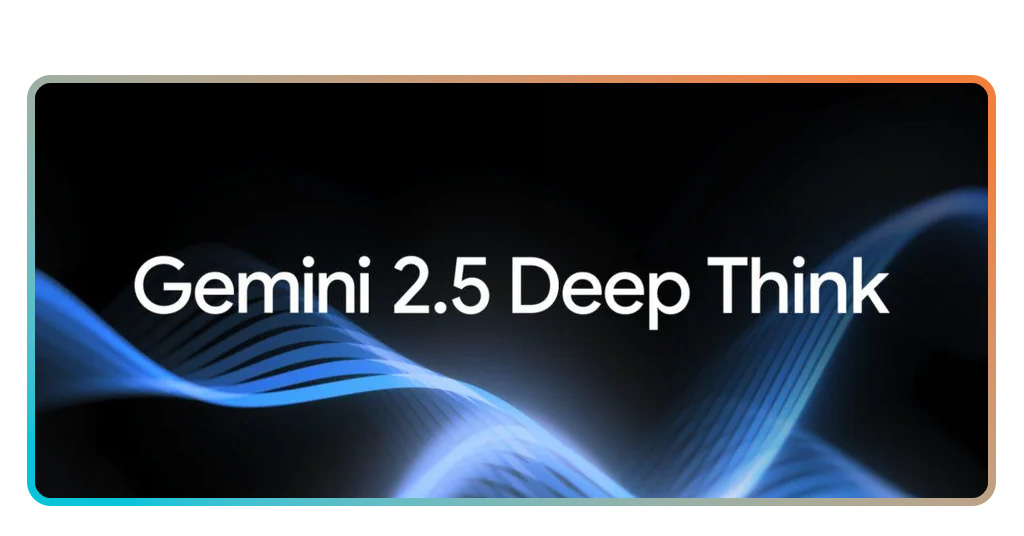Artificial intelligence has already rewritten how we search, work, and sometimes even procrastinate. But every once in a while, a new model pops up and makes the tech world collectively raise an eyebrow. That’s the case with Gemini Deep Think, Google’s fresh experiment in advanced reasoning.
Unlike earlier releases that tried to wow us with speed or casual small talk, Deep Think has a different ambition: to simulate real thought processes. Google is betting big on reasoning as the next competitive edge in AI, and if early reactions are any indication, they might be onto something. Before you start rolling your eyes at “yet another AI,” let’s break it down.
- Stimuler la créativité et l'efficacité avec Gemini
- Android Hacks: How to Switch From Google Assistant to Gemini AI
- How to Use Gemini AI on Samsung Smartphones
Why Gemini is Google’s most powerful AI yet
Google was playing catch-up for a while. While OpenAI’s ChatGPT was busy dominating headlines, Google was rebranding Bard, merging it with Gemini, and promising that its true power was just around the corner.
Entrer Gemini Deep Think — the first version that feels like a statement rather than a reaction.
Here’s what makes it stand out:
- It can explore multiple possible answers at once, instead of locking into the first idea;
- It emphasizes logical reasoning, making responses more consistent and less “hallucinated”;
- It integrates directly with Google tools, which means tighter search, better fact-checking, and real-time information;
- It’s positioned not just as a chatbot, but as a model for research, creativity, and learning.
In other words, Google is finally trying to convince us that Gemini is not just late to the party, but it might actually be hosting the afterparty.
Try Gemini Deep Think on your phone or browser
One of the biggest wins for Gemini is accessibility. No need for special invites, beta codes, or secret handshakes.
If you’re curious, you can try Gemini Deep Think today either through the site officiel, le Android app, or the iOS version.
4.7/5
That means you can test its reasoning abilities right from your phone while waiting for your coffee, or on your browser if you’re “working” but actually want to see how far AI has come.
If you’re still skeptical, Google’s own overview spells out what’s new. The company frames Deep Think as part of a broader roadmap, which suggests this is only the beginning.
Translation: expect updates, tweaks, and probably some flashy marketing to follow.
Best prompts to explore its reasoning power
You don’t need to be a tech journalist to realize that how you ask determines what you get. To see Gemini flex its reasoning muscles, try prompts that force it to compare, hypothesize, or solve complex problems.
Some examples worth testing:
- “Compare three different business strategies for launching a new café in a crowded market”;
- “Explain quantum entanglement to a 10-year-old, then to a graduate student”;
- “Suggest creative storylines for a sci-fi novel that mixes AI and ancient mythology”;
- “What are the pros and cons of working remotely in different countries?”.
Unlike simpler models, Gemini Deep Think is designed to handle these layered questions by breaking down reasoning steps. That doesn’t mean it’s flawless (no AI is), but it’s far less likely to derail into nonsense compared to older versions.
If you’ve ever tested prompts on ChatGPT and felt the answer was a little too polished or generic, Gemini’s approach might surprise you.
Differences between Gemini and ChatGPT
Let’s address the elephant in the room: how does Gemini Deep Think compare to OpenAI’s ChatGPT? The short version is that both are strong, but they’re playing slightly different games.
- Reasoning vs. polish: Gemini leans into reasoning depth, while ChatGPT often delivers smoother, more “human-like” prose;
- Integration vs. independence: Gemini has native ties to Google Search and Docs, while ChatGPT is more standalone (unless you’re using plugins or GPTs);
- Experiment vs. stability: Deep Think is still in limited testing, so expect quirks, while ChatGPT feels more mature and reliable;
- Use cases: ChatGPT excels for content generation and brainstorming, while Gemini wants to be your partner for research and problem-solving.
Of course, the rivalry is as much about branding as it is about features. Google framing Gemini as a “thinking AI” is both a technical claim and a marketing pitch. Whether it delivers consistently over time is what will truly matter.

Who should use Gemini: students, creators, developers?
The better question might be: who shouldn’t use it? Because the potential audiences are broad, but the benefits look different depending on who you are.
- Students: Gemini can help with research summaries, explaining tricky concepts, or generating study guides;
- Creators: writers, designers, and marketers can lean on it for brainstorming, idea testing, and even refining drafts;
- Developers: with reasoning built in, it’s handy for debugging, code review, and exploring multiple solutions to a programming problem;
- Professionals: anyone who spends hours sifting through data or documents could use it as a smarter search companion.
Sure, AI isn’t going to write your thesis or launch your start-up for you, but if you use it as a tool — not a crutch — Gemini Deep Think can give you a sharper edge.
4.7/5
Where to go from here
Google wants you to believe this is the future of AI, and maybe it is. But the real test will come from everyday users putting Gemini through its paces. If you want to see how it stacks up, download the app or try it on the web today.
And if you’re already exploring the AI universe, you might enjoy discovering other tools that help with trying Google’s latest experiments.
Just remember: hype cycles come and go, but the best tech sticks around because it proves useful.
File this under “worth a try”. Test Gemini Deep Think now, play with prompts, and see how this new reasoning model measures up against your expectations.





